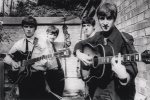 Tim Ripley, Ask Me Why, said Rock is typified by “more adult themes: isolation, despair, alienation, loss and the positive correlations of peace, communication, self-worth, vision and hope.” Note that the “positives” contain only unemotional hope type while the first mentioned qualities, the important ones, are all emotion. Nowhere is happiness, content, love triumphant, friendship mentioned. Misery is the only legitimate truth. Rock & Roll is adequately defined by the “jury” of Juke Box Jury in Britain and Dick Clarks American Bandstand in the US: “it’s got a beat and you can dance to it.” I looked all over the web, Wikkipedia to Rolling Stone Magazine and nowhere did I find anything approaching a definitive definition. Ian MacDonald, Revolution in the Head, opines that Rock concentrates of feel and beat rather then on music. That Rock is laid-back while “pop” tries to catch a moment, story, or feeling. Later (p. 206) he says the difference between pop at its best and Rock is well-crafted music.” Take that, Hoagie Carmichael, Bert Bacrack!! Most of the books aggressively name John Lennon as a master of Rock, primarily because of his tendency to wallow in misery and this in many ways probably set the preoccupation of Rock with the negative emotions. Rock critics celebrate John’s emotionality even when they imagine most of it and somehow find something to love in George3’s insecurity, status as lead guitar or soloist. Paul’s skill and competence playing and singing however is seen as insecurity and unfair to John and Georges perceived insecurities. Riley claims that Paul’s universality is a sin in Rock as Rock people aren’t like everybody else. Rock is said to be marked by something they call “texture” although I can’t imagine any music that lacked it. I have read that Rock specifically sets “listening pleasure” out of consideration in favor of commiting to the idea that if you enjoy it as music it’s not Rock. I do understand that everyone who writes professionally about the Beatles or abut Rock needs a to stay in with the Rock press but that knowledge doesn’t quite make me forgive MacDonald, Riles and all the others for crumbling before those prejudices. John would no doubt have been discarded from the Rock mainstream for Double Fantasy had he not been killed before they got into print. If any singer/composer sinned against the Rock rules, Double Fantasy is the album in evidence. If you have suggestions for refining a definition of “Rock” I’d be grateful if you’d share it with me. [Sorry for the delay, I haven’t been well and only got my computer problems lessoned a couple days ago.]
Tim Ripley, Ask Me Why, said Rock is typified by “more adult themes: isolation, despair, alienation, loss and the positive correlations of peace, communication, self-worth, vision and hope.” Note that the “positives” contain only unemotional hope type while the first mentioned qualities, the important ones, are all emotion. Nowhere is happiness, content, love triumphant, friendship mentioned. Misery is the only legitimate truth. Rock & Roll is adequately defined by the “jury” of Juke Box Jury in Britain and Dick Clarks American Bandstand in the US: “it’s got a beat and you can dance to it.” I looked all over the web, Wikkipedia to Rolling Stone Magazine and nowhere did I find anything approaching a definitive definition. Ian MacDonald, Revolution in the Head, opines that Rock concentrates of feel and beat rather then on music. That Rock is laid-back while “pop” tries to catch a moment, story, or feeling. Later (p. 206) he says the difference between pop at its best and Rock is well-crafted music.” Take that, Hoagie Carmichael, Bert Bacrack!! Most of the books aggressively name John Lennon as a master of Rock, primarily because of his tendency to wallow in misery and this in many ways probably set the preoccupation of Rock with the negative emotions. Rock critics celebrate John’s emotionality even when they imagine most of it and somehow find something to love in George3’s insecurity, status as lead guitar or soloist. Paul’s skill and competence playing and singing however is seen as insecurity and unfair to John and Georges perceived insecurities. Riley claims that Paul’s universality is a sin in Rock as Rock people aren’t like everybody else. Rock is said to be marked by something they call “texture” although I can’t imagine any music that lacked it. I have read that Rock specifically sets “listening pleasure” out of consideration in favor of commiting to the idea that if you enjoy it as music it’s not Rock. I do understand that everyone who writes professionally about the Beatles or abut Rock needs a to stay in with the Rock press but that knowledge doesn’t quite make me forgive MacDonald, Riles and all the others for crumbling before those prejudices. John would no doubt have been discarded from the Rock mainstream for Double Fantasy had he not been killed before they got into print. If any singer/composer sinned against the Rock rules, Double Fantasy is the album in evidence. If you have suggestions for refining a definition of “Rock” I’d be grateful if you’d share it with me. [Sorry for the delay, I haven’t been well and only got my computer problems lessoned a couple days ago.]
Archive for April 2009
Defining Rock
April 30, 2009Comments on/ from books
April 8, 2009 To me the most shocking thing about the first person books about the Beatles is that almost all (except George Martin and Geoff Emerick) ignore the music completely. Peter Brown, Tony Bramwell, Tony Barrow, Allan Williams, Bill Harry, Mike McCartney, Alistair Taylor, etc. and even Pete Best hardly mention it and if they do, it only the first 3 or 4 hits. Not one of them seem to have cared at all what the Beatles wrote or recorded so long as it hit the top of the charts. It appears to me that virtually everyone whose salaries the Beatles paid (all of NEMS as well as all of Apple) neither enjoyed nor understood the music.
To me the most shocking thing about the first person books about the Beatles is that almost all (except George Martin and Geoff Emerick) ignore the music completely. Peter Brown, Tony Bramwell, Tony Barrow, Allan Williams, Bill Harry, Mike McCartney, Alistair Taylor, etc. and even Pete Best hardly mention it and if they do, it only the first 3 or 4 hits. Not one of them seem to have cared at all what the Beatles wrote or recorded so long as it hit the top of the charts. It appears to me that virtually everyone whose salaries the Beatles paid (all of NEMS as well as all of Apple) neither enjoyed nor understood the music.
They were all hooked on the mania and their soft jobs. Few of them ever saw the Beatles as persons nor were actively concerned for them. From Liverpool or the far ends of the earth, they all were concentrated on milking their cash cow with little thought of what the cow wanted or needed. No wonder Klein looked good and no wonder Paul stuck to an in-law to manage his career and money.
“…confused with its naïvely anarchistic bourgeois cousin, rock journalism.” From Clayson, I think. My own thoughts are somewhat less printable.
Odd question: With all the fuss about a not-red rose/carnation and bare feet why have I read no speculation about why George rides a dark horse (giggle) in the Penny Lane video when the others ride white ones? “they rode their white horses out through an archway in a ruined wall,” From Lewisohn’s Chronicles – and he’s usually more careful!


Recent Comments